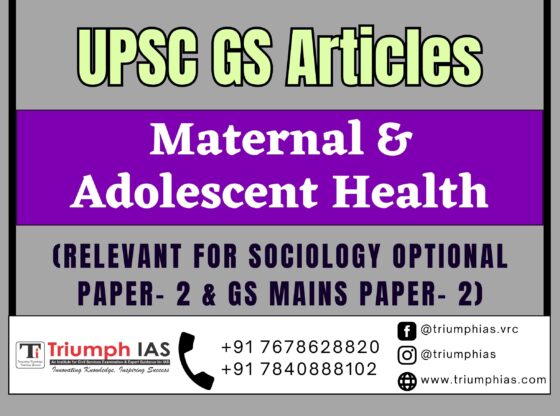Maternal & Adolescent Health
Relevant for sociology optional Paper- 2 & GS Mains Paper- 2

Maternal and Adolescent Health is a critical area of concern for India. It is an essential aspect of the country’s overall development and progress. The health of mothers and adolescents is critical as it directly impacts the health and well-being of the entire population. Maternal and Adolescent Health encompasses a wide range of health issues, including reproductive health, nutrition, hygiene, and mental health.
India has made significant progress in reducing maternal mortality rates over the years. According to the latest data available from the Ministry of Health and Family Welfare, India’s maternal mortality ratio (MMR) has declined from 174 per 100,000 live births in 2011-13 to 113 in 2016-18. However, this is still far from the Sustainable Development Goal (SDG) target of reducing MMR to below 70 per 100,000 live births by 2030. The situation is worse in rural areas, where access to healthcare services is limited.
One of the major challenges in maternal health is the lack of adequate antenatal care (ANC) services. According to a recent report by the National Family Health Survey (NFHS) 5, only 55.5% of pregnant women in India receive the recommended four or more ANC visits during their pregnancy. This is a major concern as ANC plays a critical role in detecting and managing pregnancy-related complications.
Another significant issue in maternal health is the lack of access to skilled birth attendants. Although the proportion of institutional deliveries has increased significantly over the years, there is still a significant gap in the availability of skilled birth attendants, particularly in rural areas. The lack of skilled birth attendants increases the risk of maternal and neonatal mortality and morbidity.
Inadequate nutrition is also a significant concern in maternal health. Malnutrition during pregnancy increases the risk of adverse pregnancy outcomes, including low birth weight, preterm birth, and maternal and neonatal mortality. According to NFHS-5, 22% of pregnant women in India are underweight, and only 50% of women consume iron and folic acid supplements during pregnancy.
Adolescent health is another critical area of concern in India. Adolescents, defined as individuals between the ages of 10 and 19 years, constitute nearly one-fifth of India’s population. The health and well-being of adolescents are critical as they are the future of the country. Adolescent health encompasses a wide range of health issues, including sexual and reproductive health, mental health, substance abuse, and nutrition.
One of the major challenges in adolescent health is the lack of awareness and education about sexual and reproductive health. According to NFHS-5, only 47.8% of adolescent girls (aged 15-19 years) have comprehensive knowledge about HIV/AIDS, and only 42.5% of married adolescent girls use modern contraceptive methods. The lack of access to quality reproductive health services and information increases the risk of unintended pregnancies, unsafe abortions, and sexually transmitted infections (STIs).
Mental health is another critical concern in adolescent health. According to the World Health Organization (WHO), depression is the leading cause of disability among adolescents globally. In India, the prevalence of mental health problems among adolescents is high, with nearly 10-20% of adolescents experiencing mental health issues. However, mental health services for adolescents are inadequate, and there is a lack of awareness and education about mental health issues.
Substance abuse is another major concern in adolescent health. According to NFHS-5, nearly 7% of adolescent boys (aged 15-19 years) and 1.3% of adolescent girls (aged 15-19 years) use tobacco. Substance abuse not only affects the physical health of adolescents but also increases the risk of mental health problems, academic failure, and delinquent behaviour. To address the challenges in maternal and adolescent health, India has implemented several initiatives and programs over the years. The National Health Mission (NHM), launched in 2005, aims to provide accessible, affordable, and quality healthcare services to all. The NHM has several components, including the Reproductive, Maternal, Neonatal, Child and Adolescent Health (RMNCH+A) program, which focuses on improving maternal and child health outcomes. The program includes several interventions, including improving access to ANC services, promoting institutional deliveries, and providing nutrition and health education to women.
The government has also launched several initiatives to address adolescent health issues. The Rashtriya Kishor Swasthya Karyakram (RKSK), launched in 2014, aims to improve the health and well-being of adolescents in India. The program includes several interventions, including providing comprehensive sexual and reproductive health services, promoting mental health, and preventing substance abuse.
Despite these initiatives, several challenges persist in maternal and adolescent health in India. One of the major challenges is the lack of infrastructure and resources in rural areas. Rural areas lack adequate healthcare facilities, skilled health personnel, and transportation facilities, making it difficult for women and adolescents to access healthcare services. Another significant challenge is the lack of awareness and education about health issues. Many women and adolescents are not aware of the importance of ANC services, nutrition, and hygiene. Similarly, many adolescents are not aware of the risks associated with substance abuse, unsafe sex, and mental health issues.
In conclusion, maternal and adolescent health is a critical area of concern for India. It is essential to address the challenges in maternal and adolescent health to achieve the SDG targets and ensure the health and well-being of the population. The government must continue to invest in healthcare infrastructure and resources, particularly in rural areas, and promote awareness and education about health issues. It is also essential to involve communities, civil society organizations, and other stakeholders in the efforts to improve maternal and adolescent health in India. By working together, we can ensure a healthy and prosperous future for all.
For more such free UPSC notes, Articles, News & Views Join our Telegram Channel. https://t.me/triumphias
Click the link below to see the details about the UPSC – Civils courses offered by Triumph IAS. https://triumphias.com/pages-all-courses.php


